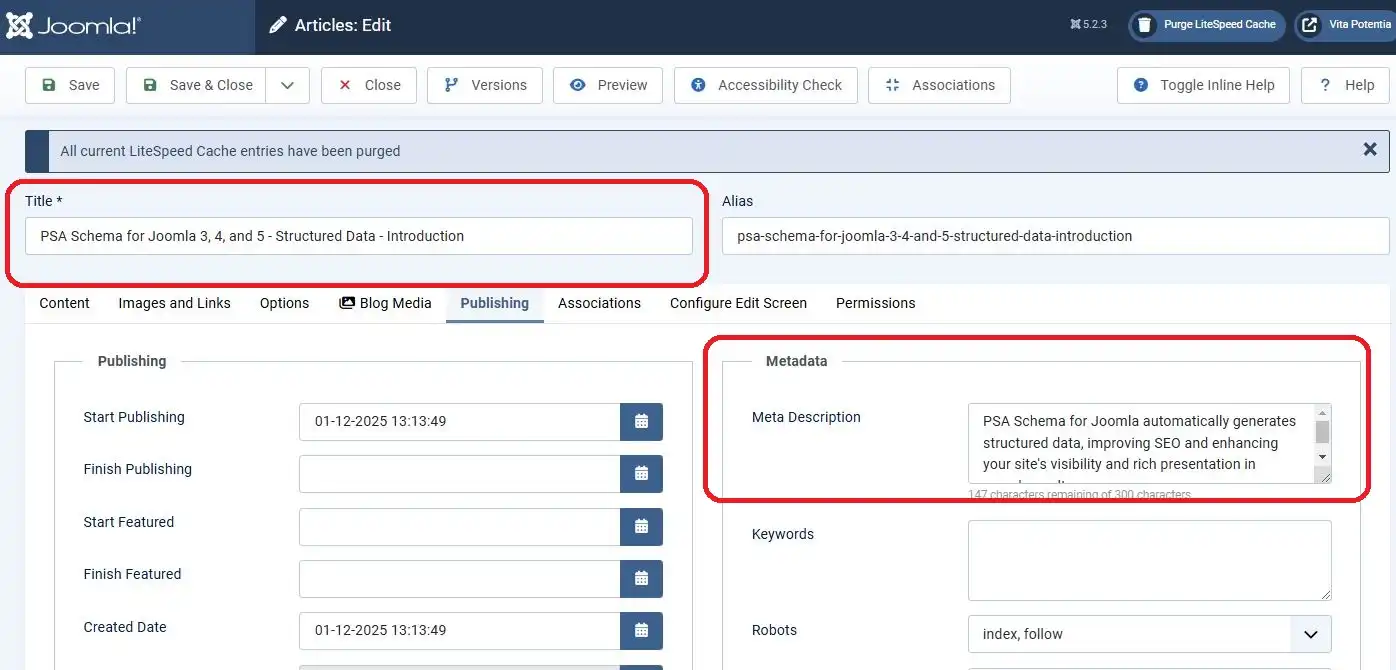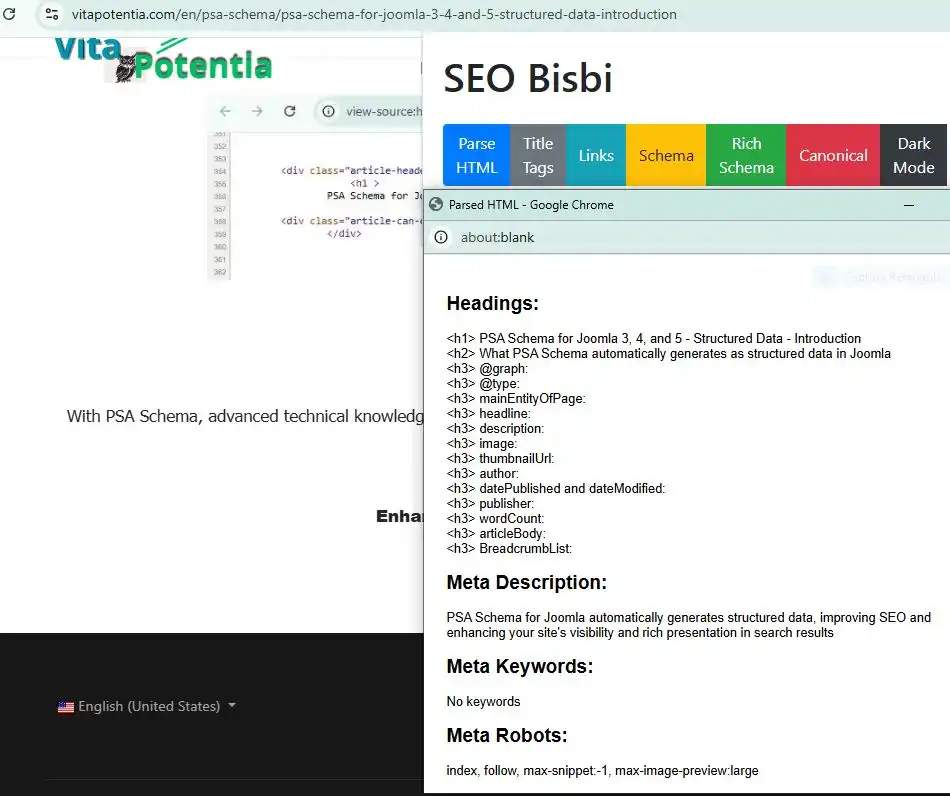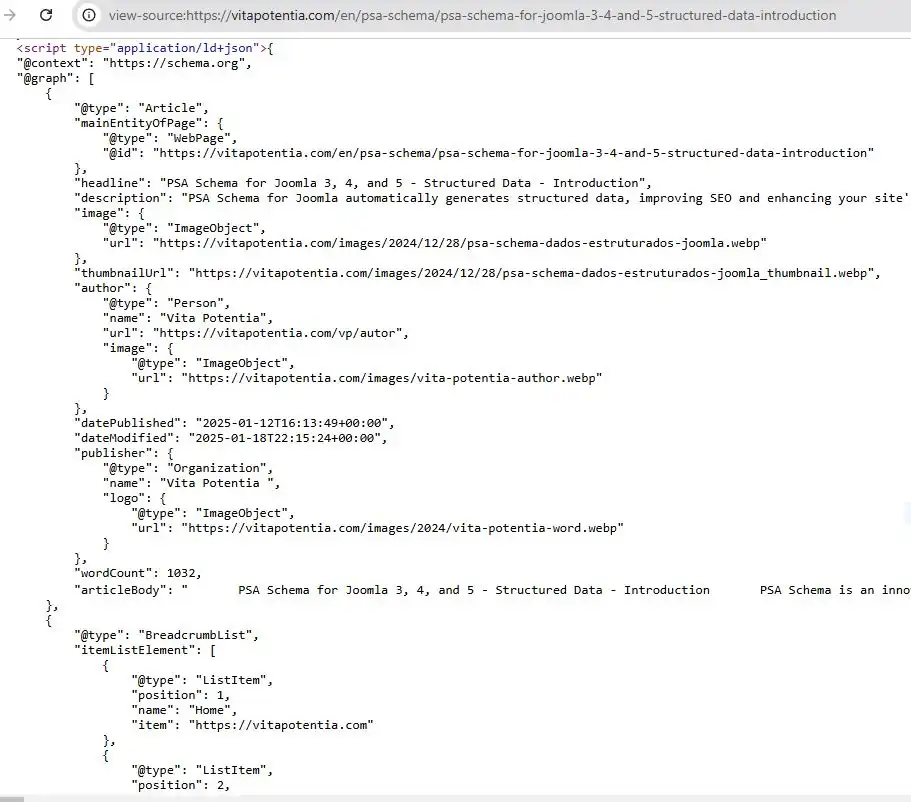
PSA Schema for Joomla 3, 4, and 5 - Structured Data - Introduction
PSA Schema is an innovative plugin developed for Joomla that facilitates the automatic creation of structured data, optimizing your pages for search engines.
With this plugin, you ensure greater visibility and richer presentation of your content in search results.
The PSA Schema was developed exclusively for articles.
It works in two ways:
When the menu links to a category, all articles within that category will have their structured data automatically generated.
When the menu links directly to individual articles, the structured data for those articles will also be automatically generated.
In SEO, categories or tags are not ranked; instead, it is the keywords within the articles that get ranked.
After installation and basic setup, simply define a unique author with their page and image. From there, PSA Schema automatically generates structured data, including:
What PSA Schema automatically generates as structured data in Joomla
@graph:
Structures different types of data into a single, organized block. It gathers all related information, such as articles, authors, and navigation.
@type:
Specifies the type of each element, such as Article (article), BreadcrumbList (navigation list), or ImageObject (image). It helps search engines identify the purpose of each section.
mainEntityOfPage:
Identifies the main page containing the article, ensuring that Google and other search engines know which URL represents the main content.
headline:
Defines the article’s title, making it visible and understandable to search engines.
description:
Adds a summary or description of the article, often used to enhance the snippets displayed in search results.
image:
Inserts the main image URL as an ImageObject, helping search engines recognize the article’s representative image.
thumbnailUrl:
Adds the thumbnail URL of the image, which may be displayed in snippets or visual carousels in search results.
author:
Creates a Person entity representing the article’s author, including the name, author page URL, and an image, increasing content credibility.
datePublished and dateModified:
Record the article’s publication and last modification dates, which are essential for highlighting updated content in search engines.
publisher:
Defines the organization responsible for the content, including the name and logo, strengthening brand identification in search results.
wordCount:
Automatically counts the number of words in the article, a metric used by search engines to rank content.
articleBody:
Inserts the full content of the article in structured text, allowing search engines to better understand the presented content.
BreadcrumbList:
Creates a hierarchical navigation list with links such as Home, categories, and the article title. It enhances user navigation and improves SEO.
Search engines, especially Google, process JSON-LD millions of times faster than HTML content. While HTML needs to be rendered and analyzed, structured JSON provides direct and instant information, making it easier to understand and index the content.

The plugin uses basic HTML and identifies the page title through the tag. In Joomla, the configuration is done in the Menu, and for categories, it should be set as shown in the images:
Menu Joomla Category

Menu Joomla Options

PSA Schema plugin captures in page source code

If you prefer, install the Chrome add-on to quickly check with SEO Bisbi

It was shown how to obtain the correct HTML for the page title using the tag for Categories in the Menu.
Now, see the difference in Menu configuration for a direct Article to obtain the tag and make it easier for Google and other search engine bots, including the correct way for PSA Schema to capture and insert the structured data properly.
Small changes can lead to significant impacts, especially when it comes to SEO. A common mistake happens on category pages, where the category name is set as
. For instance, a blog page might use "Blog" as the
, which is not ideal for SEO.
Spending a few minutes reviewing and testing this configuration on your site can make a big difference. Remember, on websites with thousands of pages, even a small adjustment in the setup can have a significant impact on results.
⚠️ If you can't find a solution, we suggest as a last resort using this plugin, Aimy H1. If it doesn't find any H1 on a page, it takes the first H2 and turns it into an H1.
However, I believe you can configure it correctly through the Joomla Menu itself.
What other Structured Data can be added to Joomla with the PSA Schema?
The items above are automated, while these are manual. The user will fill in the data in the Structured Data Generator and save them within the corresponding folder, named after the page where they will be used.
Structured Data Schema is a set of standardized markups that help search engines better understand a website's content and display it more effectively in search results.
Below is a summary of the functionalities of the main Schema categories, with mention of the PSA Schema plugin, which facilitates the integration of these markups:
Geo (Geolocation)
Represents geographical information, such as latitude and longitude, useful for precise location data.
Course
Provides details about courses, including title, description, providers, and format.
FAQ (Frequently Asked Questions)
Structures questions and answers for optimized display in Google results.
LocalBusiness
Highlights information about local businesses, such as address, operating hours, and services.
Review
Displays ratings and reviews, ideal for showcasing product or service feedback.
Recipe
Structures culinary recipe information, such as ingredients, preparation time, and reviews.
Car (Automobiles)
Designed to display specific vehicle information, such as make, model, and price.
EmployerAggregateRating
Summarizes aggregated employer ratings, useful for showcasing company reputation.
SoftwareApplication
Details information about software, including features, pricing, and compatibility.
Event
Presents data about events, such as dates, location, and ticket information.
Book
Structures information about books, including title, author, and ISBN.
JobPosting
Highlights job opportunities with descriptions, salaries, and locations.
VideoObject
Represents video information, such as title, description, and thumbnail.
ClaimReview
Indicates fact-checking validations or statement analyses.
Image
Structures data about images to improve their indexing.
Place
Represents places, including descriptions and locations.
Product
Structures product information, such as name, price, and availability.
Organization
Provides details about organizations, such as name, contact information, and address.
The PSA Schema plugin simplifies the implementation of these markups, ensuring websites are optimized for search engines and stand out with rich snippets.
With PSA Schema, advanced technical knowledge is not required. It works in the background to generate all this information, saving time and ensuring compliance with Google standards.
Enhance your SEO today with PSA Schema for Joomla!


 English (United States)
English (United States)  Русский (Россия)
Русский (Россия)  Deutsch (Deutschland)
Deutsch (Deutschland)  Español (España)
Español (España)  Português (Brasil)
Português (Brasil)